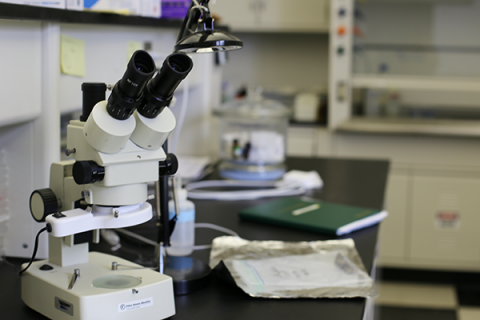5 Reasons Why Louisiana is a Geology Goldmine
Choosing the best geology grad program for you is much more than just finding the right university—it’s about finding the right university in the right location.
Louisiana is the perfect location for studying geology: on the gulf coast, in the heart of oil and gas country, and with access to numerous local natural and professional resources. Incorporating these resources into our teachings and research fosters professional networking opportunities and exposes our graduate students to real world applications of geology. 
“That’s something this university and department does really well: we focus on our local strengths and use them to our advantage,” says Dr. Brian Schubert, graduate coordinator for the master’s in geology program. “If we ignored this great laboratory, it would be a disservice to our students and the community, as well, because we naturally serve them.”
Here are the reasons why you should earn your master’s in geology at UL Lafayette.
1. We focus on interdisciplinary studies that incorporates both the environment and energy resources.
Louisiana is an oil and gas state, but it’s also a state with a big stake in water and soil resources. The intersection of environmental geology and traditional petroleum energy studies requires an interdisciplinary approach that combines biology, chemistry, and geology—and that’s the focus of our master’s in geology coursework and research at UL Lafayette.
For example, one of our most popular classes is clay mineralogy because it touches on a wide range of interests for students involved in environmental and energy careers. Clays are important for the petroleum industry, because they’re used within drilling-fluids and are also used for determining the potential for oil and gas in a particular area. Because petroleum comes from organic matter, students must understand the organisms that produce the petroleum resource and the sedimentology. Clays are also important for soils, environmental contamination, and remediation.
2. We work closely with local industries, which translates into opportunities for students.
Our close ties with local industry means we get feedback and input from the broader professional community about the skills and knowledge the students in our geology grad program need, so our curriculum and coursework are always updated to reflect those requirements.
Our master’s in geology students are active participants with LAGCOE, the Lafayette Geological Society, and Louisiana Geological Society. Our students attend the weekly meetings and talks, and make connections with these professionals, who become their employers and mentors.
3. Your local environment is your lab—and it’s expansive.
One thing you may not know about Louisiana is that it is home to more than 40% of the country’s wetlands—making them an enormous resource for our master’s in geology students. There are opportunities and funding at both the state and federal levels for studying wetlands and wetland loss, which is of the utmost importance for Louisiana residents who rely on the fisheries and shrimping industries, as well as for flooding patterns.
Oil and gas exploration is also a huge industry in Louisiana, with an average of more than 500 million barrels of crude oil produced annually. Our master’s students often take advantage of their proximity to this industry through research, internships, competitions, and grants.
4. We teach adaptability.
Today, master’s in geology graduates have a pretty broad expertise, but they also need to be adaptable. Our industry partners tell us that they need employees who have strong reading, writing, and interpretation skills--that their area of expertise is not as important as their ability to communicate their research or their work.
We utilize different teaching styles to help our graduates communicate their findings effectively. For example, in our research-focused stable isotope class, students are using the new stable isotope lab in their projects, but they don’t use a textbook. They use journals and articles instead. Throughout the semester, they take measurements and report on their findings at the end of the semester in a conference-style presentation. It’s an experience that you won’t get with a professor who lectures in front of a chalkboard.
5. There are so many job opportunities here — and our students prepared for jobs across the country, too.
A lot of our students are from Louisiana, but our number of out-of-state students and international students is rapidly increasing. The job market is one of the factors pulling these students here, because earning your master’s in geology at UL Lafayette means you’ll connect with local professionals who are looking to hire the best and the brightest.
But that doesn’t mean you’re limited to career opportunities just in Louisiana. They’re researching internationally, along with mapping and exploration jobs in and beyond the West. Our students are interested in traveling and living in all sorts of places, and we make sure they’re prepared for whatever career path they want.
Find out more about our geology grad program >
